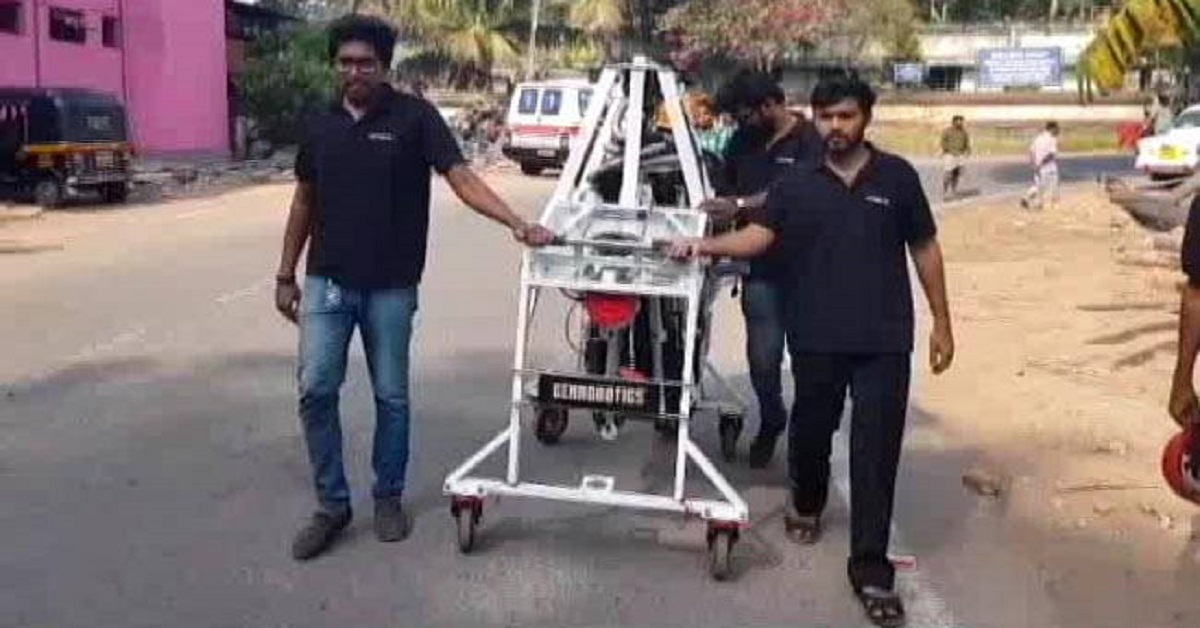
Ever wondered who cleans manholes? How suffocating it must be for those who are assigned this job?
In a first in Kerala, the state government will soon be utilizing the services of robots to clean sewer holes.
The trial runs of the robot, developed by a startup company, Genrobotics, have been successfully held recently and the product will be launched next week, Kerala Water Authority (KWA) Managing Director, A Shainamol said.
“The Kerala government is very excited about the project,” Shainamol said.
The robot, equipped with Wi-Fi, Blue Tooth and control panels has four limbs and a bucket system attached to a spider web looking extension to scoop out the waste from sewers.
READ ALSO: Armies to gain trained robots; new AI algorithms come to play
The project is supported by KWA, which has joined hands with Kerala start-up mission to transform new ideas into practical technologies for addressing issues relating to pipe leakage and sanitation.
“Our intention is to promote local talent. Now the product, being fully funded by the government, is ready and it will be launched next week,” she said.
Initially, the services of the robot, christened ‘Bandicoot’ will be utilized in Thiruvananthapuram, which has over 5,000 manholes.
The trial run of the robot, developed by the nine-member group of youngsters from varying engineering streams, had been conducted successfully in the state capital recently, CEO and Chief Product architect of Genrobotics, Vimal Govind said.
The youngsters have given up their steady jobs to find a solution to end manual scavenging in an effort to bring in some resemblance of dignity to the lives of these ‘invisible’ men who are paid a pittance between Rs 300-500 for their effort running into several hours.
READ ALSO: Mid-30’s cleaners’ death at jobsite in Bengaluru suburb
According to Govind during the trials held near the Medical college here, about 30 kg of garbage was pulled out by the robot and they were shocked to find sanitary napkins, clothes, surgical blades among other stuff in the clogged manholes. Within an hour, the robot could clean four manholes on the first day itself with ease and it did not face any problem to maneuver its way to different types of manholes.
“This will be a life-changing opportunity for the cleaning men.. their life will become better.. Though happy with the product, they are apprehensive if they will lose their source of livelihood,” he said.
However, there was no cause for any worry says Chief Operating Officer Rashid K as their plan was to train existing workers to operate the robot, which was as easy to handle as a remote-controlled toy car.
All the commands in the user interface were now in English.
But this can be converted to any local language for easy understanding of the scavengers, he said.
The team took 7-8 months to design the semi-automatic robot.
An MOU has already been signed between the Kerala Water Innovation Zone under the KWA and Kerala Startup Mission (KSUM) for transfer of technology.
‘Attukal Pongala’ on March 2 will be the litmus test for the ‘Bandicoot’ which will commence its operations by cleaning sewer holes in the city during the festival when lakhs of women from all over the country will converge here to offer Pongala to the diety.
READ ALSO: Hospital conducts its first robotic surgeries; a successful mission
Enquiries relating to the Robot have come in from neighboring states of Tamil Nadu, Karnataka, and Maharashtra besides from countries like Canada and UK.
The team has also been invited to attend the National consultative workshop on Solid Liquid Resource Management (SLRM) on Feb 22, 23 at Delhi, which is an initiative of Swachh Bharat to introduce the Robot.
Founded in 2015, GenRobotics was initially focusing on powered exoskeletons which are robotic suits that can help humans to reduce the physical effort needed for heavy jobs.
The robot is powered by pneumatics (using gas or pressurized air) since using heavy electronic equipment inside is risky as they can react with the explosive gases present in the manhole.
Since there are no official figures on the number of people involved in manual scavenging in Kerala, the state government is planning to undertake a pilot study at Ernakulam or Kozhikode to ascertain the same, Suchitwa? mission sources said.
Based on the outcome of the pilot study, a state-wide survey would be held, the sources added.

Post Your Comments